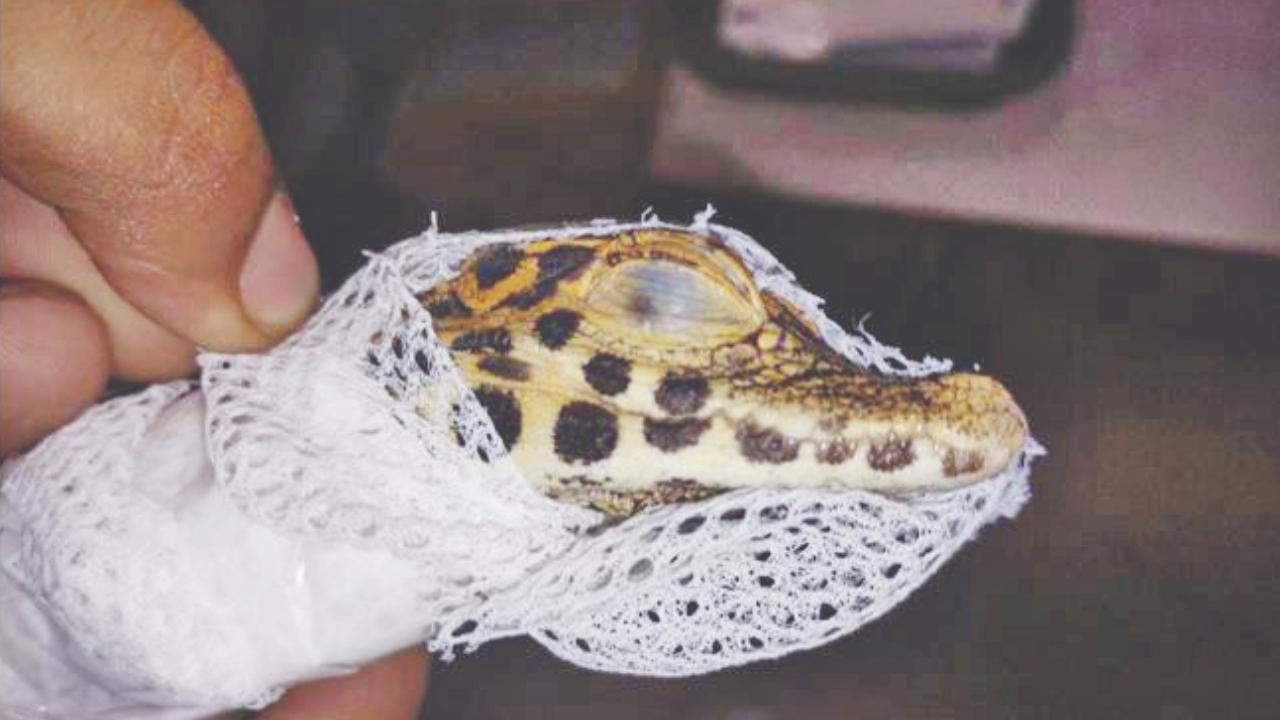The arrested individuals have been identified as Mohammed Rehman Madni, 41, and Hamaz Mansuri, 30. Both are residents of Kurla

Officials said the reptiles were concealed in a box inside a trolley bag. Pic/Mumbai Customs
The customs officials at the Mumbai airport on Sunday intercepted two passengers, who were later arrested, for allegedly smuggling at least five baby caiman crocodiles (caiman crocodilus).
ADVERTISEMENT
According to officials, the passenger had arrived from Bangkok. The incident took place on Friday (September 27). These crocodiles were concealed inside a rectangular box, which had been placed in a trolley bag.
The arrested individuals have been identified as Mohammed Rehman Madni, 41, and Hamaz Mansuri, 30. Both are residents of Kurla.
Following their arrest, the duo were brought to the court, which granted them judicial custody for further investigation.
Officials said they have informed the regional deputy director for wildlife crime control bureau, western region, Navi Mumbai.
After rescuing, the reptiles were handed over to the RAWW (Resqink Association for Wildlife Welfare), an NGO specialising in wildlife rescue and rehabilitation.
"The organisation took immediate steps to stabilise the juvenile crocodiles, ensuring they were hydrated, fed, and kept in appropriate conditions while their health was monitored," said another customs official.
In coordination with concerned authorities, RAWW worked to ensure the reptiles would be safely deported back to their country of origin.
The increasing popularity of exotic pets like the caiman crocodile raises concerns about the impact of illegal wildlife trade. Smuggling these protected species not only threatens their survival in the wild but also endangers ecosystems and poses a health risk to local wildlife populations, said a customs official.
Another customs official said that the case remains under investigation as they work to uncover the broader network involved in the smuggling operation.
These caiman crocodiles, often referred to as "mini crocodiles," are becoming popular among exotic pet enthusiasts. Their small stature makes them an attractive option for those looking for unusual and exotic pets. However, owning or trafficking these reptiles is illegal in many countries, including India, due to their protected status under wildlife laws, a wildlife expert said.
"The appeal of these reptiles lies in their manageable size compared to larger crocodile species. Caiman crocodiles can grow to about 4-6 feet, making them a sought-after option for individuals seeking a "wild" pet experience without the challenges that come with bigger crocodiles. This illegal demand, however, is fueling the black market trade that poses significant risks to both the animals and local ecosystems,” added the expert.
"These species are kept as exotic pets. These were added as schedule IV species along with ball python and others to the wildlife (protection) act in the recent amendment in 2023," said Santosh Shinde from SARRP foundation.
"Caiman crocodiles are usually smuggled for their skin. Leather products made from their skin have high value,” he added.
 Subscribe today by clicking the link and stay updated with the latest news!" Click here!
Subscribe today by clicking the link and stay updated with the latest news!" Click here!







